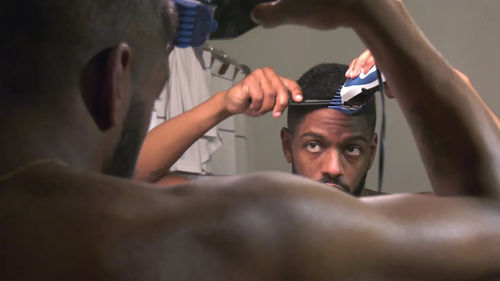
Manscaped magnificently spotlights three men doing their best to reimagine the barbershop as we know it.
If you’ve ever visited a barbershop and felt uncomfortable, you’re not alone. The oddly hypermasculine, “sports and bros” of many barbershops is put on blast in Broderick Fox’s documentary Manscaping (★★★★★, CRITIC’S PICK).
Fox spotlights three men doing their best to reimagine the barbershop as we know it: trans barber Jessie Anders, Black visual artist Devan Shimoyama, and fetish barber and porn producer Richard Savvy.
The men discuss not only their own experiences with horrible haircuts, but also their efforts to transform the barber experience — whether that’s putting trans people at the front of the queue, or stripping down to help freshen you up.
Anders specifically created his barbershop to be a safe space for trans and queer people to get a haircut — one without the misgendering or anxiety of traditional barbershops, as one customer voices while being trimmed by Anders.
In his shop, trans people are given priority, he operates a sliding pricing scale to cater to lower incomes, and he even stocks products and resources for trans people, including shape enhancers and chest binders.
A scene with two parents watching their trans son receive a haircut that affirms their identity — while Anders talks from his own experience — is particularly affecting.
For Savvy, being the Naked Barber helped free him and his clients from worries about body confidence. After all, what better way to stop someone worrying about taking their clothes off for a waxing if the barber is already naked?
And Savvy goes even further, fully embracing the queerness of his services by tidying up clients while they’re resting in a sling.
“There are no odd, awkward questions. There’s no weirdness,” one client says. “It’s just normal.” Of course, he does go further through his own porn output — fully embracing the kink and intimacy of the situation, and indulging the fantasy of a barbering experience.
Shimoyama differs from the others by challenging barbershops through art — specifically by celebrating Black hair and queerness.
He discusses the racism and discrimination he and others have felt due to their hair, whether hairdressers and barbers saying they don’t cut textured hair, or friends forcing themselves back into the closet for a trim — the trauma of something as (seemingly) simple as a haircut on full display and very recognizable.
Shimoyama responds to that anxiety, that stress through his art — directly challenging the masculinity and the intimidation by queering them through fluorescent colors, Swarovski crystals, and more. His paintings, as he notes, are the exciting, alternate dimension gay barbershop he would love to visit.
Fox has constructed an excellent film, with tight editing and a clear, interconnected narrative covering three different aspects of the interaction between queer experience and performatively masculine spaces. It’s likely that most queer people have felt some degree of anxiety prior to entering a barbershop — as Shimoyama puts it, the need to “quiet” oneself.
Manscaping unashamedly takes aim at those hostile spaces — whether they intend to be or not — and the innate fears all queer people have in exposing themselves a little too much to those we don’t quite know well enough.
In their own ways, Anders, Savvy, and Shimoyama are tackling that fear, and Fox spotlights them beautifully.

